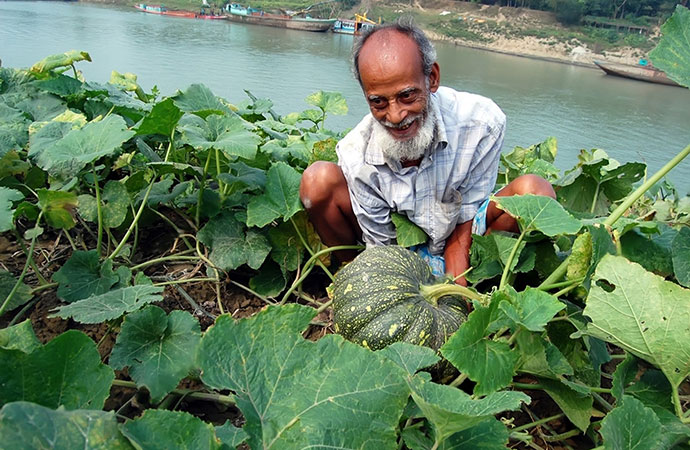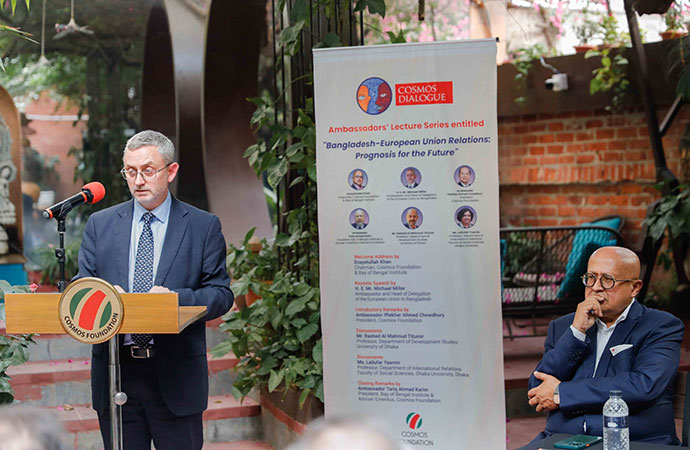Column

Photo: Collected
Bangladesh's farmers are facing an intensifying crisis as they struggle to secure fair prices for their produce. Oversupply, soaring production costs, inefficient market management and limited access to finance have left many farmers in distress. This issue is not just an economic concern-it is a political one as well. As the next general election approaches, it is imperative to acknowledge that farmers are not merely agricultural producers; they are also voters whose voices must be heard.
Struggle for Fair Prices
One of the most frustrating examples of this crisis is the fate of sweet pumpkin farmers in Chandpur's Sadar and Hajiganj upazilas. Once a profitable crop, sweet pumpkins are now being sold as cattle feed due to a surplus in production and the absence of wholesalers. Many farmers, like Lokman Hawladar of Devpur, are forced to sell their pumpkins at a meagre Tk 8 per kilogram-far below the production cost-to cattle farmers. Others have simply left their pumpkins to rot by the roadside.
According to the Agriculture Department, the area under sweet pumpkin cultivation in Hajiganj has surged from 286 hectares last year to 618 hectares this year. This oversupply has triggered a price collapse, leaving farmers struggling to recover their investments. Officials have advised them to take their produce to local markets, but this has done little to ease their distress.
The situation is equally dire for potato farmers, particularly in Munshiganj, a key supplier of the country's potatoes. After securing good prices last year, farmers expanded cultivation, only to face a market crash. Production costs have risen to Tk 20 per kilogram in some areas, yet potatoes are selling at Tk 10-12 per kilogram. Many farmers are now unable to afford cold storage, fertilisers and labour costs.
The Middlemen Menace
The primary culprits behind this price disparity are middlemen, who manipulate the agricultural supply chain. These profiteering intermediaries purchase produce at extremely low rates from farmers and then significantly inflate prices through multiple layers of distribution, from commission agents to wholesalers and retailers. As a result, farmers receive only a fraction of their rightful earnings, while consumers in urban areas pay exorbitant prices.
Market analysts point out that the price of vegetables in Dhaka's kitchen markets is 100-300% higher than at the farm level. The Department of Agricultural Marketing (DAM) acknowledges this disparity. While many people struggle to afford vegetables, farmers are simultaneously being deprived of fair prices.
Agriculture's Role in Bangladesh's Economy
Agriculture remains a cornerstone of Bangladesh's economy, employing over 35% of the workforce. Bangladesh has about 16.5 million farming families, accounting for 28% of the country's population. Nearly 40% of all farm households are crop-sharers, cultivating land they do not own. Sharecropping remains a dominant land-tenure arrangement, with cultivators and landowners splitting the harvest.
Despite facing challenges such as decreasing arable land, rapid population growth and climate change, Bangladesh's agricultural sector has made remarkable progress. The country continues to produce rice, wheat, jute and vegetables to sustain its population. But persistent struggles-such as inadequate infrastructure, high-interest loans and unpredictable climate conditions-threaten the sector's sustainability.
Farmers' Political Power
Beyond market fluctuations, farmers face systematic neglect in policy discussions and election campaigns. Despite their crucial role in ensuring national food security, their concerns are often marginalised. Political leaders must recognise that farmers are not just workers; they are a powerful voting bloc. If mobilised, their electoral influence could shift the nation's policy landscape. Political parties frequently include agricultural reforms in their manifestos, but these promises often go unfulfilled. If farmers become more actively engaged in elections, scrutinise political pledges, and organise advocacy groups, they can demand policies that genuinely benefit them.
Enabling Farmers to Vote
Despite their numbers, many farmers face obstacles in political participation. Living in remote areas, they often have limited access to information about candidates and policies. Their demanding agricultural work leaves little time for political engagement and many feel disillusioned by unfulfilled promises.
To strengthen their participation, the election commission as well as the government must ensure farmers can vote without difficulty. Measures such as mobile polling stations, awareness campaigns, and provisions for those working in the fields on election day could help increase voter turnout among farmers. Besides, media and civil society organisations must play a role in educating them about their voting rights and the significance of their political involvement.
A Call for Urgent Action
As the North Bengal Farmers' Convention in Kurigram recently highlighted that the struggles of farmers cannot remain ignored. It rightly pointed out that Bangladesh is a country built on agriculture, yet the very people who sustain the nation are being politically sidelined.
Farmers' votes matter, and they have the power to shape Bangladesh's future. Policymakers must recognise this reality and prioritise the needs of those who feed the nation. If Bangladesh is to safeguard its agricultural future, it must start by standing with its farmers today.

























Leave a Comment
Recent Posts
Auspicious beginnings, but a l ...
The newly elected government of Bangladesh is now in office, and the e ...
Caught between tigers and pira ...
Over 10,000 fishermen in the Sundarbans have suspended their fishing a ...
Historic Chawk Bazar comes alive with iftar items on ..
Shaping Young Conservationists: School Conservation ..
Iran has said it has reached an understanding with t ..
New Finance Minister Amir Khosru Mahmud Chowdhury